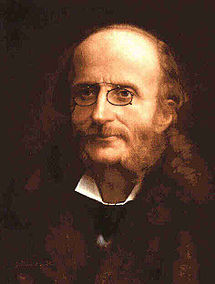- Die Rheinnixen
-
Jacques Offenbach  Operas
Operas- Les deux aveugles (1855)
- Le violoneux (1855)
- Ba-ta-clan (1855)
- La rose de Saint-Flour (1856)
- Le 66 (1856)
- Le financier et le savetier (1856)
- La bonne d'enfant (1856)
- Croquefer, ou Le dernier des paladins (1857)
- Le mariage aux lanternes (1857)
- Mesdames de la Halle (1858)
- La chatte métamorphosée en femme (1858)
- Orpheus in the Underworld (1858)
- Geneviève de Brabant (1859)
- Daphnis et Chloé (1860)
- Le pont des soupirs (1861)
- M. Choufleuri restera chez lui le . . . (1861)
- Monsieur et Madame Denis (1862)
- Les bavards (1862)
- Il signor Fagotto (1863)
- Lischen et Fritzchen (1863)
- Die Rheinnixen (1864)
- La belle Hélène (1864)
- Barbe-bleue (1866)
- La vie parisienne (1866)
- La Grande-Duchesse de Gérolstein (1867)
- Robinson Crusoé (1867)
- L'île de Tulipatan (1868)
- La Périchole (1868)
- Les brigands (1869)
- Le roi Carotte (1872)
- Fantasio (1872)
- Pomme d'api (1873)
- Maître Péronilla (1873)
- La jolie parfumeuse (1873)
- Bagatelle (1874)
- Madame l'archiduc (1874)
- Le voyage dans la lune (1875)
- Madame Favart (1878)
- La fille du tambour-major (1879)
- The Tales of Hoffmann (1880, unfinished)
Die Rheinnixen (French: Les fées du Rhin, The Rhine Nixies) is a romantic opera in four acts by Jacques Offenbach. The original libretto by Charles-Louis-Etienne Nuitter [1] was translated into German by Alfred von Wolzogen.
The Elves’ Song from Die Rheinnixen was later used by Ernest Guiraud when completing The Tales of Hoffmann, where it became the "Barcarolle" (Belle nuit, ô nuit d'amour), performed in the so-called Giulietta Act.
Contents
Performance history
The first performance was given (in a truncated form owing to the illness of the tenor Alois Ander [2]) on 4 February 1864 at the Hoftheater in Vienna.
The first full performance was given at the Corum, Montpellier 30 July 2002 with Regina Schörg, Nora Gubisch, Piotr Beczala, and Dalibor Denis, and the Orchestre National de Montpellier, conducted by Friedemann Layer. This was recorded (see below). The first fully staged performance was given in Ljubljana by the Slovenian National Opera under Dieter Rossberg on 13 January 2005. Performances followed in Trier and at the Opéra de Lyon under Marc Minkowski later in 2005, and in Cottbus in 2006. (These performances, like the original Vienna premiere, were all given in German.) New Sussex Opera gave the British premiere of the work, under the title The Rhine Fairies, in October 2009, conducted by Nicholas Jenkins. [3]
Roles
Role Voice type Premiere Cast, 8 February 1864[4] Conrad von Wenckheim, leader of the elector of the Palatinate's mercenaries baritone Beck Franz Waldung, a mercenary captain, originally from the locality tenor Alois Ander Gottfried, a hunter bass Mayerhofer Hedwig, tenant of a Sickingen farm on the Rhine mezzo-soprano Destinn Armgard, her daughter soprano Wildauer A fairy soprano First mercenary tenor Willem Second mercenary baritone Soutscheck A farmer tenor Campe Winegrowers, peasants, mercenaries, elves, and fairies Synopsis
The story, involving soldiers and peasants and elves and fairies, takes place in and around the castle of Franz von Sickingen, near Kreuznach on the Rhine, during the wars of the 16th century.
Recordings
Offenbach: Les fées du Rhin (in German) - Orchestre National de Montpellier
- Conductor: Friedemann Layer
- Principal singers: Regina Schörg, Nora Gubisch, Piotr Beczala, Dalibor Jenis
- Recording date: 2002
- Label: Universal / Accord CD 472 920-2[5]
References
- Notes
- ^ Real name Truinet, of which Nuitter is an anagram.
- ^ Ander was the tenor selected for the intended Vienna premiere of Tristan und Isolde who proved incapable of mastering the role of Tristan during rehearsals between 1862 and 1864.
- ^ Musicweb International review, accessed 19 November 2009
- ^ Theaterzettel Vienna
- ^ Recordings as listed on operadis-opera-discography.org.uk/CLOFRHEI
- Sources
- Amadeus Almanac, accessed 19 November 2008
- Boosey and Hawkes page
- Jean-Christophe Keck's Documentation 2002-2006; Berlin 2006 pdf, accessed 19 November 2009
- Critical edition
- Offenbach (1864), Les fees du Rhin (Die Rheinnixen). Arranged by Jean-Christophe Keck, vocal Score 574 pages. Bote & Bock ISBN 9790202530399
External links
Categories:- Operas by Jacques Offenbach
- German-language operas
- Operas
- Romantische Opern
- 1864 operas
- Operas set in Germany
Wikimedia Foundation. 2010.
